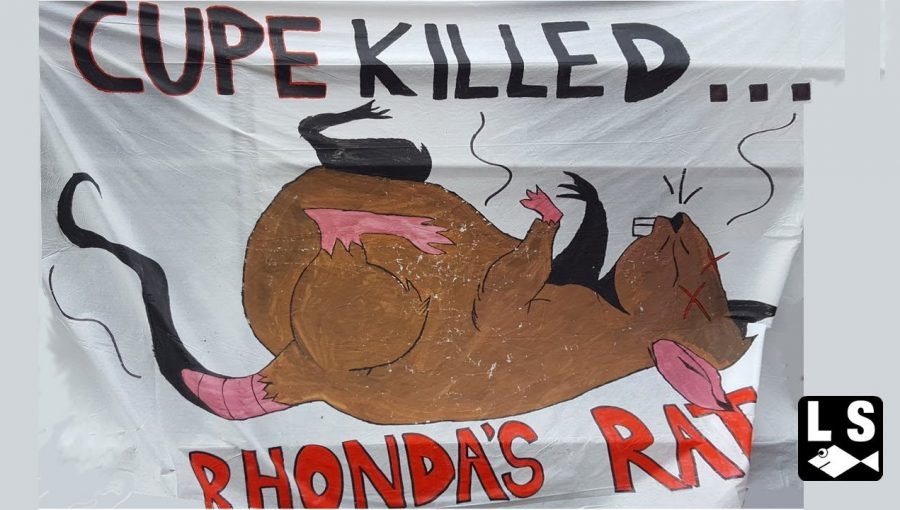The Toronto ‘Garbage Strike’ and the Critique of Ideology
After six months of contract negotiations with the City of Toronto, union members of CUPE locals 79 (representing inside workers) and 416 (representing outside workers) went on strike on June 22nd, 2009. Twenty-four thousand city workers walked off the job to fight demands from ‘cash-strapped’ city management, which is asking city workers to make concessions in their new contract. The top issues in this strike are job security, seniority, and the highly contested issue regarding the banking of sick days that can be cashed out upon retirement. The strike has caused a ‘disruption’ to several municipal services in Toronto, the most visible of which is the cessation of residential garbage pickup.
Within the first week of the strike, the city announced that it would be opening 19 different ‘drop off’ sites for residential trash. These sites were then set up in various public parks across the city. The decision to use local public parks as (what are effectively) garbage dump sites has sparked anger amongst residents who are in an uproar about the whole situation, confused about which side to ‘blame’: the city or the union.
A strike like this, one which has been holding for over one month, is surely bound to cause frustration amongst the public. However, the ‘garbage strike’ also provides us with some interesting insight into the function of ideology, today.
In his 1997 book, The Plague of Fantasies, the Slovenian philosopher and psychoanalyst, Slavoj Žižek, refers to the differences between German, French and Anglo-American toilets to make a point regarding the form of ideology. The form of ideology, at its most basic, according to Žižek, has to do with the different ways in which we dispose of shit. The triad – French, German, Anglo-Saxon – Žižek tells us, was first interpreted by the German philosopher, G.W.F. Hegel as the triad of German ‘reflective thoroughness’ (philosophy/metaphysics), French ‘revolutionary hastiness’ (revolutionary politics), and English moderate utilitarian pragmatism (liberal economics). For Žižek, each of these elements of German, French, and English culture can be interpreted into the different styles of toilets in each country: German – shit falls on a flat surface at the back and is flushed through a hole at the front – ambiguous contemplative fascination: one can look at, and reflect upon their own shit; French – the hole is bigger and at the back so shit can fall directly into the hole and disappear immediately – hasty attempt to get rid of the unpleasant excess as fast as possible: revolutionary radicalism; English-American – taking elements from both, the shit remains but floats in water – the pragmatic approach to treat the excess as an ordinary object to be disposed of in an appropriate way.
Confronting the Invisible
This, I think, is the best way to understand the current ‘garbage strike’ in Toronto. What the garbage strike confronts us with is our own excrement, with our own shit. Here we have a perfect example of the invisible suddenly becoming visible. The transformation of public parks into dump sites is forcing Torontonians to encounter, directly, the waste of their lives: we are forced to see the sight of all of our junk, and to smell the odour of our waste. We are being forced to encounter the obscene underside of our everyday ‘normal’ pleasant existence.
Torontonians are also being forced to confront the invisible labour involved in getting rid of their trash, which is to say that, under ‘normal’ circumstances, no one bothers to question how our trash is disposed of; no one wonders how our junk magically gets taken away and disappears from our lives. Where does it go? But more importantly, how does it get there, and who takes it there? No one really cares to think about this under regular circumstances. Things just seem to happen.
Of course we all know that there are ‘garbage men.’ We know that there are dump sites. We know that we have a hefty ecological crisis on our hands, to boot! However, at the same time, we choose to ignore these things because it is more convenient to do so. In other words, it is convenient for us to avoid thinking too much about where our junk ends up, who gets rid of it for us, etc… It is convenient because it helps us to get on with our everyday lives; it is what allows us to function. If we were constantly worried about these intricate details of a society, we would probably lose our ability to function properly.
I’m reminded, also, of Fritz Lang’s classic film, Metropolis (1927), which depicts a future dystopian society, where all the labour of the city, the labour that works the gears and greases the axles, exists below the city. The labour that makes the city work, in other words, is kept hidden. The privileged and luxurious lives of those who live in the city above are maintained by the hidden, invisible labour of the workers below the city. In order for the city above to function, in order those above to have their lives of luxury, and remain content, the labour that makes the city work must remain unseen.
The reason why the garbage strike is so traumatic, the reason why it causes such anxiety is twofold: on the one hand, it forces us, literally, to confront our shit; we are faced with the excrement of our own existence. On the other hand, this strike, like any strike, creates a rupture in the proper functioning of society. As well, it highlights antagonisms that are already present in our society. Antagonisms that we’d rather ignore, because they too get in the way of the ‘proper’ everyday functioning of our society (such as the antagonism between workers and employers).
But what is most significant about the rupture caused by the garbage strike is that it forces us to think about the way in which our trash is disposed of. It forces us, in other words, to confront the hidden workers below our metropolis. Like in Žižek’s toilet example, the way in which we organize the disposal of our shit says quite a bit about the ideology organizing our own culture and society.
However, the real question is: once this strike is resolved (because, in our post-political era of expert administration, we all, of course, expect that this crisis will be resolved eventually) what new form of organization, what new ‘contract’ or relation of production will emerge? What form, what shape, will the disposal of our shit take? What form will, not only the striking union members accept, but also more importantly, what form will the citizens of Toronto accept? This, I think, indicates something significant about ideology, today: what ‘idea’ is most convincing for the majority of people regarding the way in which we dispose of our trash? But more importantly, what idea is most convincing regarding the way we perceive the labour of those who dispose of our trash?
My worry is that our culture is too much like the Anglo-Saxon, moderate, utilitarian, pragmatic culture described by Žižek: the cynical attitude that predominates today is: we can’t find a new answer, nothing else works, there is no alternative, the best we can do is to try to work out a plan that works for everyone.
The problem with this is that, truth be told, the plan that works is not always that plan that is best for everyone.
A few voices have been heard suggesting that, in the midst of an economic crisis, people should have the decency not to strike. After all, we all have to take cuts; we all have to suffer a little. Yet, this attitude is, more than anything, based upon the neoliberal, conservative, ‘trickle down’ ideology: in times of economic prosperity, wealth trickles down to the lower classes from the wealthy; and, likewise, during a recession, the debt of the wealthy ‘trickles down’ to the lower classes – those who didn’t take the economic risk in the first place. So, yes, we are in the midst of an economic ‘crisis.’ Yes, there is a recession; but in relative terms, those who suffer for the debt of the wealthy pay a lot more than those who own (or, usurp) the wealth. Relatively speaking, the wealthy can still enjoy a life of luxury, while those who produce the wealth are left in want.
Rather than chastise the striking CUPE 79 and 416 members for walking off the job during an economic downfall we should ask: why isn’t everyone? The question shouldn’t be, ‘why are they doing this?’ – ‘why are they striking?’ – ‘why are they causing such a disruption?’ It should be, ‘why aren’t we all?’ Aren’t bad times the most important times to demand that our own labour goes toward benefiting our own lives!
Regardless of the outcome, a strike like this tells us that without the labour of those who dispose of our trash, we’ll all end up in deep shit! •





